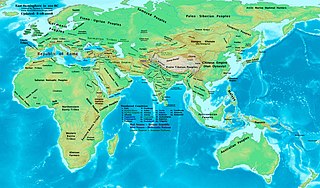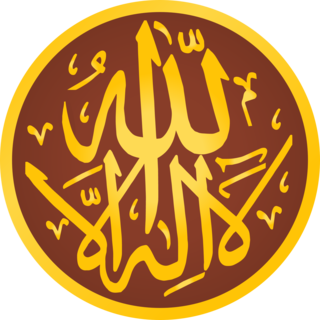Related Research Articles

Allah is the common Arabic word for God. In the English language, the word generally refers to God in Islam. The word is thought to be derived by contraction from al-ilāh, which means "the god", and is linguistically related to the Aramaic words Elah and Syriac ܐܲܠܵܗܵܐ (ʼAlāhā) and the Hebrew word El (Elohim) for God.

Religion in pre-Islamic Arabia included indigenous Arabian polytheism, ancient Semitic religions, Christianity, Judaism, Mandaeism, and Iranian religions such as Zoroastrianism, and Manichaeism.
Monotheism is the belief that there is only one deity, an all-supreme being that is universally referred to as God. A distinction may be made between exclusive monotheism, in which the one God is a singular existence, and both inclusive and pluriform monotheism, in which multiple gods or godly forms are recognized, but each are postulated as extensions of the same God.

Sharia is a body of religious law that forms part of the Islamic tradition. It is derived from the religious precepts of Islam and is based on the sacred scriptures of Islam, particularly the Quran and the Hadith. In Arabic, the term sharīʿah refers to God's immutable divine law and is contrasted with fiqh, which refers to its human scholarly interpretations. The manner of its application in modern times has been a subject of dispute between Muslim fundamentalists and modernists.
Lord is an appellation for a person or deity who has authority, control, or power over others, acting as a master, chief, or ruler. The appellation can also denote certain persons who hold a title of the peerage in the United Kingdom, or are entitled to courtesy titles. The collective "Lords" can refer to a group or body of peers.

Yama or Yamarāja (यमराज), is a deity of death, dharma, the south direction, and the underworld who predominantly features in Hindu and Buddhist religion, belonging to an early stratum of Rigvedic Hindu deities. In Sanskrit, his name can be interpreted to mean "twin". He is also an important deity worshipped by the Kalasha and formerly by the Nuristani peoples, indicating his prominence in ancient Hinduism.
In law, a legal person is any person or 'thing' that can do the things a human person is usually able to do in law – such as enter into contracts, sue and be sued, own property, and so on. The reason for the term "legal person" is that some legal persons are not people: companies and corporations are "persons" legally speaking, but they are not people in a literal sense.
A qāḍī is the magistrate or judge of a sharīʿa court, who also exercises extrajudicial functions, such as mediation, guardianship over orphans and minors, and supervision and auditing of public works.

A nationwide judicial system in Iran was first implemented and established by Abdolhossein Teymourtash under Reza Shah, with further changes during the second Pahlavi era.

Hudud is an Arabic word meaning "borders, boundaries, limits". In the religion of Islam it refers to punishments that under Islamic law (sharīʿah) are mandated and fixed by God as per Islam. These punishments were applied in pre-modern Islam, and their use in some modern states has been a source of controversy.
Haukim is a pre-Islamic deity who was originally worshipped in Qataban, in what is now South Arabia. He was concerned with arbitration and the law. He is often mentioned together with Anbay, another god of justice.
'Amm was a moon god worshipped in ancient Qataban, which was a kingdom in ancient Yemen. 'Amm's name stems from the Arabic word for paternal uncle. The inhabitants of the kingdom referred to themselves as the Banu Amm, or the "Children of Amm". He was also revered as a weather god, as his attributes included lightning bolts. His consort is the goddess Asherah, and he was served by the oracle-judge Anbay.
Atarsamain was an astral deity of uncertain gender, worshipped in the pre-Islamic northern and central Arabian Peninsula. Worshipped widely by Arab tribes, Atarsamain is known from around 800 BC and is identified in letters of the Assyrian kings Esarhaddon and Assurbanipal. Atarsamain may be identical with Allāt, whose cult was centred on Palmyra and also with Attar.

Qataban was an ancient Yemeni kingdom which existed from the early 1st millennium BCE till the late 1st or 2nd centuries CE.

Lady Justice is an allegorical personification of the moral force in judicial systems. Her attributes are scales, a sword and sometimes a blindfold. She often appears as a pair with Prudentia.
Ruda is a deity that was of paramount importance in the Arab pantheon of gods worshipped by the North Arabian tribes of pre-Islamic Arabia.

The Shahada, also transliterated as Shahadah, is an Islamic oath and creed, and one of the Five Pillars of Islam and part of the Adhan. It reads: "I bear witness that there is no god but God, and I bear witness that Muhammad is the messenger of God."
The feminist movement has effected change in Western society, including women's suffrage; greater access to education; more equitable pay with men; the right to initiate divorce proceedings; the right of women to make individual decisions regarding pregnancy ; and the right to own property.

A deity or a god is a supernatural being who is considered divine or sacred. The Oxford Dictionary of English defines deity as a god or goddess, or anything revered as divine. C. Scott Littleton defines a deity as "a being with powers greater than those of ordinary humans, but who interacts with humans, positively or negatively, in ways that carry humans to new levels of consciousness, beyond the grounded preoccupations of ordinary life".
References
- ↑ Jordan, Michael (2014-05-14). Dictionary of Gods and Goddesses. Infobase Publishing. ISBN 9781438109855.
- ↑ Hoyland, Robert G. (2002-09-11). Arabia and the Arabs: From the Bronze Age to the Coming of Islam. Routledge. pp. 127, 141. ISBN 9781134646340.